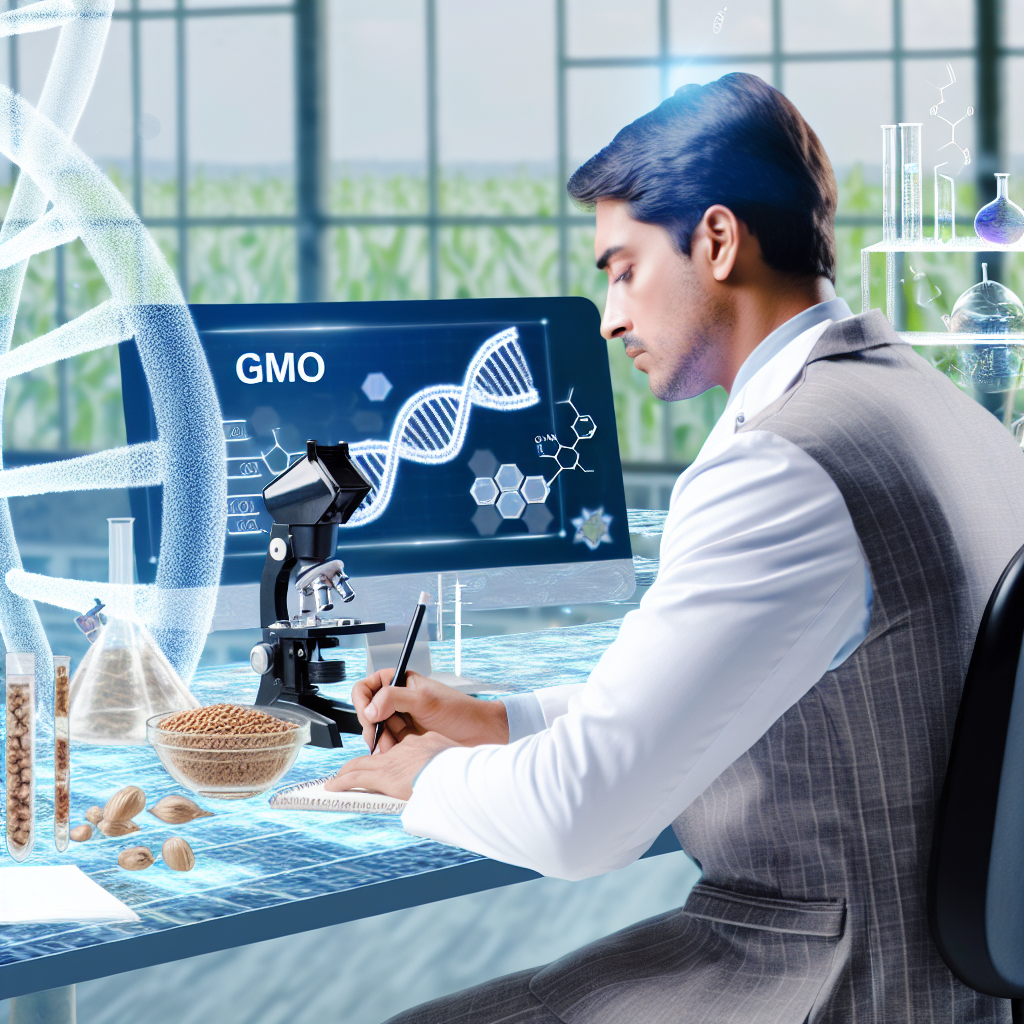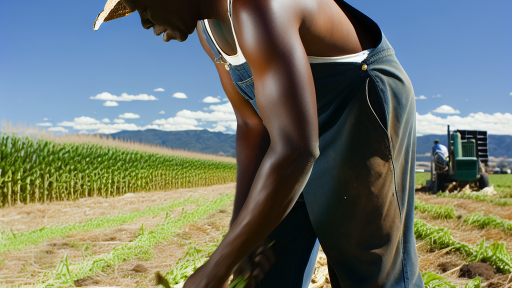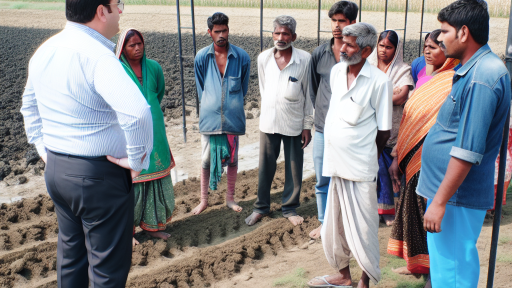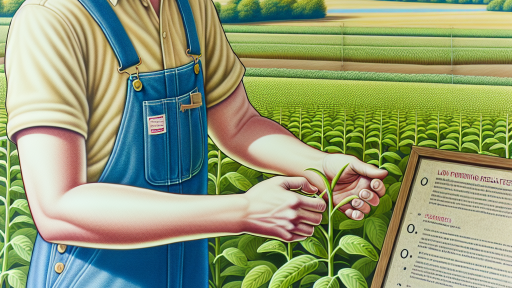Introduction to Biotechnology in Agriculture and Its Importance
Biotechnology plays a crucial role in modern agriculture.
It enhances crop yields and improves pest resistance.
Farmers increasingly rely on these technologies for sustainable practices.
Through biotechnology, we can develop crops that thrive in diverse environments.
Benefits of Biotechnology in Agriculture
Biotechnology offers several significant advantages to farmers.
- It reduces dependence on chemical pesticides.
- This technology promotes environmental sustainability.
- It leads to healthier food options for consumers.
- Biotechnology helps mitigate the effects of climate change.
How Biotechnology Enhances Crop Production
Scientists utilize genetic modification to enhance crop traits.
This process can improve nutritional content and shelf life.
Additionally, it allows for faster growth rates in certain crops.
Farmers can use biotech crops to address specific agricultural challenges.
The Role of GMOs in Sustainable Farming
Genetically modified organisms (GMOs) are pivotal for sustainable agriculture.
They help in reducing the carbon footprint associated with farming.
Moreover, GMOs can lead to less soil degradation over time.
Farmers benefit from increased efficiency in resource use.
Regulations Surrounding Biotechnology
Regulations ensure the safety and efficacy of biotechnology in agriculture.
Governments assess environmental risks before crop approval.
Transform Your Agribusiness
Unlock your farm's potential with expert advice tailored to your needs. Get actionable steps that drive real results.
Get StartedPublic acceptance is also crucial for the successful adoption of GMOs.
Transparency in labeling helps consumers make informed choices.
Future Prospects of Biotechnology in Agriculture
The future of biotechnology in farming looks promising.
Continued research and development will drive innovations.
Emerging technologies may result in climate-resilient crops.
These advancements aim to secure food production for a growing population.
Overview of Genetically Modified Organisms and Their Role in Sustainable Farming
Definition of Genetically Modified Organisms
Genetically modified organisms (GMOs) are organisms whose genetic material has been altered.
This modification occurs through biotechnology techniques.
Such techniques include gene editing and transgenesis.
Scientists often use these methods to improve certain traits.
Benefits of GMOs in Agriculture
GMOs provide several advantages for sustainable farming.
For instance, they enhance crop yield and resistance to pests.
This leads to reduced reliance on chemical pesticides.
Additionally, GMOs can withstand extreme weather conditions.
This resilience helps ensure food security.
Environmental Impact of GMOs
The use of GMOs contributes positively to environmental health.
For example, GMOs can reduce soil erosion and water usage.
This occurs because farmers can grow resilient crops in marginal lands.
Moreover, they can contribute to biodiversity preservation.
Regulations and Safety Standards
Regulatory bodies oversee the approval and use of GMOs.
In many countries, rigorous testing ensures their safety for humans and the environment.
These regulations help address public concerns about GMOs.
Furthermore, they set standards for labeling and monitoring.
Future Directions in GMO Research
Research continues to advance the field of biotechnology.
Showcase Your Farming Business
Publish your professional farming services profile on our blog for a one-time fee of $200 and reach a dedicated audience of farmers and agribusiness owners.
Publish Your ProfileNew techniques focus on improving nutritional content in crops.
Additionally, scientists aim to develop crops that can grow in challenging climates.
This research supports the ongoing goal of sustainable agriculture.
Current Regulations and Safety Assessments for GMOs in Agriculture
Overview of Current Regulations
Regulations for GMOs vary widely across countries.
In the United States, the USDA oversees the use of GMOs in agriculture.
Additionally, the FDA evaluates the safety of biotechnology products.
In the European Union, stricter regulations apply to GMO cultivation and labeling.
Countries like Brazil and Argentina have their own distinct frameworks for GMOs.
Safety Assessments Process
The safety assessment process ensures GMOs do not pose health risks.
Proponents must submit data on the GMO to regulatory agencies.
This data includes information on potential allergens and toxins.
Regulatory bodies conduct thorough evaluations before approval.
Moreover, they monitor the long-term effects on health and the environment.
Environmental Impact Evaluations
Environmental assessments are crucial for GMO regulations.
These evaluations examine the potential risks to ecosystems.
They measure effects on biodiversity and natural habitats.
Additionally, they assess the potential for gene transfer to non-GMO plants.
Agencies may require mitigation strategies for identified risks.
Public Involvement and Transparency
Public involvement remains essential in GMO regulations.
Communities often express concerns about GMOs and their impact.
Transparency in the regulatory process builds public trust.
Moreover, education programs inform consumers about GMOs and safety assessments.
Public consultations may be held to gather feedback on regulatory proposals.
Global Trends in GMO Regulations
Worldwide, countries are reevaluating their GMO policies.
Some nations adopt more permissive stances toward biotechnology.
Conversely, others impose stricter regulations based on environmental concerns.
International trade agreements increasingly incorporate GMO regulations.
Collaboration among countries may lead to harmonized standards.
Gain More Insights: Optimizing Farm Profits with Tax Benefits
Benefits of Biotechnology and GMOs for Sustainable Farming Practices
Enhancing Crop Resistance
Biotechnology enables farmers to create crops that resist pests and diseases.
This reduces the need for chemical pesticides.
Consequently, it lowers the environmental impact of farming.
Moreover, resilient crops can endure harsh weather conditions.
This adaptability ensures higher crop yields even in challenging climates.
Improving Nutritional Value
Genetically modified organisms (GMOs) can enhance the nutritional content of crops.
For instance, biofortified crops provide essential vitamins and minerals.
This approach helps combat malnutrition in vulnerable populations.
Additionally, improved nutrition leads to better health outcomes.
Healthier populations contribute to more vibrant economies.
Promoting Sustainable Practices
Biotechnology supports sustainable farming through reduced resource use.
Showcase Your Farming Business
Publish your professional farming services profile on our blog for a one-time fee of $200 and reach a dedicated audience of farmers and agribusiness owners.
Publish Your ProfileFor example, drought-resistant crops minimize water consumption.
This efficiency is especially important in arid regions.
Furthermore, sustainable practices encourage soil health and fertility.
Healthy soil contributes to ecosystem stability and biodiversity.
Increasing Food Security
Adopting biotechnology can significantly enhance food production globally.
More efficient farming techniques address the challenges of population growth.
As a result, communities can secure reliable food sources.
This reliability is vital for stable societies.
Furthermore, it reduces the risks of food shortages.
Economic Benefits
Biotechnology can lead to cost savings for farmers.
Lower input costs result from reduced pesticide and fertilizer use.
As a consequence, farmers may experience higher profit margins.
Additionally, increased yields boost overall production efficiency.
The economic health of farming communities directly benefits local economies.
Learn More: Organic Certification And Sustainable Farming
Challenges and Controversies Surrounding GMOs in Sustainable Agriculture
Public Perception and Misinformation
Public opinion on GMOs varies widely across communities.
People often fear potential health risks associated with genetically modified foods.
Misinformation frequently spreads through social media channels.
Organizations like the Non-GMO Project advocate against GMOs as a health precaution.
Consequently, many consumers demand non-GMO labeling on products.
Environmental Concerns
Critics argue that GMOs can negatively impact biodiversity.
Some studies suggest that genetically modified crops may harm non-target species.
Moreover, the long-term ecological impacts of GMOs remain uncertain.
Additionally, pest resistance can lead to increased pesticide use.
Therefore, many environmentalists advocate for organic farming methods instead.
Regulatory Challenges
Regulations surrounding GMOs differ globally, creating complexity.
In some countries, stringent approval processes exist for GMO crops.
Conversely, in the U.S., regulations may not be as strict.
This inconsistency can confuse farmers and consumers alike.
As a result, companies often face challenges in market access.
Economic Implications for Farmers
The adoption of GMO crops can lead to varied economic outcomes for farmers.
Some farmers experience increased yields and reduced costs.
However, others may face market restrictions due to public sentiment.
Additionally, seed costs for GMO varieties can be significantly higher.
Consequently, this creates a financial burden for small-scale farmers.
Ethical Considerations
The ethical implications of GMO technology frequently spark debate.
Some argue that altering the genetic makeup of crops is unnatural.
Others contend that it is an essential tool for food security.
Farmers must navigate these ethical dilemmas when making planting decisions.
Ultimately, ethical considerations influence both policy and consumer behavior.
Showcase Your Farming Business
Publish your professional farming services profile on our blog for a one-time fee of $200 and reach a dedicated audience of farmers and agribusiness owners.
Publish Your ProfileUncover the Details: Organic Certification Process Explained

Exploring Alternative Biotechnological Approaches to Enhance Crop Resilience
Importance of Crop Resilience
Crop resilience is essential for sustainable agriculture.
Resilient crops withstand environmental stressors effectively.
Farmers benefit from increased yields and reduced losses.
Emerging Biotechnological Techniques
Various innovative biotechnological techniques are now available.
These methods aim to improve crop resistance to diseases.
They include genetic editing and synthetic biology.
Genetic Editing
Genetic editing modifies specific genes to enhance resilience.
CRISPR technology stands out in this field.
It allows precise alterations of DNA sequences efficiently.
Moreover, it accelerates the breeding process for new varieties.
Synthetic Biology
Synthetic biology combines biology and engineering principles.
Researchers design and construct new biological parts.
For instance, scientists create custom pathways for stress responses.
These pathways enhance a plant’s ability to cope with drought.
Benefits of Alternative Approaches
These biotechnological approaches offer numerous advantages.
Firstly, they support reduced pesticide use.
This approach minimizes chemical inputs in farming.
Additionally, they help maintain soil health and biodiversity.
Challenges and Considerations
Despite their benefits, challenges remain in adopting these technologies.
Public perception often influences the acceptance of GMOs.
Effective communication is crucial for addressing concerns.
Furthermore, regulatory frameworks need to adapt swiftly.
Future Directions in Research
The future of sustainable farming lies in ongoing research.
Investing in new technologies will be vital for success.
Collaboration among scientists, farmers, and policymakers is essential.
By working together, they can ensure food security and environmental sustainability.
You Might Also Like: How Water Laws Affect Your Farming Practices
Case Studies of Successful GMO Implementation in Sustainable Farming Worldwide
Introduction to Successful GMO Applications
Genetically Modified Organisms (GMOs) have transformed farming worldwide.
These technologies boost sustainability while increasing food production.
Various regions have successfully utilized GMOs to enhance agricultural outcomes.
Case Study: Bt Cotton in India
India’s adoption of Bt cotton illustrates significant advancements in sustainable farming.
Bollworm resistance has reduced pesticide use dramatically.
Farmers report higher yields and increased profits.
This success has enhanced food security and farmer livelihoods.
Case Study: Drought-Tolerant Maize in Sub-Saharan Africa
Drought-tolerant maize has revolutionized agriculture in Sub-Saharan Africa.
This crop withstands dry conditions, securing harvests for farmers.
Farmers facing climate change challenges benefit significantly from this technology.
Adoption has led to improved food availability and reduced poverty levels.
Case Study: Golden Rice in the Philippines
Golden Rice offers a solution to vitamin A deficiency in the Philippines.
Showcase Your Farming Business
Publish your professional farming services profile on our blog for a one-time fee of $200 and reach a dedicated audience of farmers and agribusiness owners.
Publish Your ProfileThis fortified rice variety provides essential nutrients to vulnerable populations.
Farmers gain access to improved varieties, enhancing health outcomes.
The project’s success demonstrates GMOs’ role in public health initiatives.
Insights from Other Global Initiatives
Successful GMO applications extend beyond the highlighted cases.
Countries like Brazil have adopted GM soy and corn with positive results.
These innovations reduce environmental impact while boosting productivity.
Benefits of GMO Technologies in Sustainable Farming
Overall, GMOs deliver numerous advantages for sustainable farming.
- They increase crop resilience against pests and diseases.
- These technologies help conserve resources like water and land.
- Farmers enjoy enhanced economic stability through higher yields.
Challenges and Considerations
Despite the successes, challenges remain in GMO adoption.
Public perception and regulatory hurdles often pose difficulties.
Education and transparent communication are essential to overcome these obstacles.
The Future of GMOs in Sustainable Practices
As research advances, the potential for GMOs continues to grow.
New traits could address emerging agricultural challenges.
Collaborative efforts can enhance global food security while promoting sustainability.
Future Trends in Biotechnology Regulations and Implications for Farmers
Current Regulatory Landscape
The regulatory landscape for biotechnology continues to evolve.
Governments worldwide are assessing the safety of genetically modified organisms (GMOs).
Regulations now often focus on environmental impact and food safety.
Farmers must navigate these rules to maximize their farming potential.
Emerging Trends in Biotechnology Regulations
Regulatory frameworks are likely to become more standardized globally.
This trend simplifies compliance for farmers operating in multiple regions.
Moreover, collaborative international efforts could promote transparency.
Farmers will benefit from clearly defined guidelines and criteria.
Impact of Genetic Editing Technologies
Gene editing technologies, like CRISPR, are gaining popularity.
These innovations require a reevaluation of current regulations.
As a result, farmers may access new crop varieties more readily.
However, they must stay informed about evolving legal responsibilities.
Implications for Sustainable Agriculture
Regulatory changes could promote sustainable agricultural practices.
Farmers may adopt new biotechnological solutions that reduce resource use.
For instance, drought-resistant crops can alleviate water scarcity issues.
Furthermore, regulations could encourage practices that enhance soil health.
Education and Training in Biotechnology
Ongoing education is essential for farmers adapting to new regulations.
Workshops and training programs can provide valuable insights.
Farmers should focus on understanding both regulations and technologies.
This knowledge will empower them to make informed decisions.
Benefits and Challenges for Farmers
Although regulations promote safety, they can pose challenges as well.
Compliance may involve additional costs and administrative work.
However, the benefits of compliant practices often outweigh these challenges.
Farmers gain access to advanced technologies that enhance productivity.
Additional Resources
Executive Order on Advancing Biotechnology and Biomanufacturing …




